The independent news organization at Duke University



By Mia Taubenblat Oct. 3, 2024 Staff Reporter
While many Duke students intend to vote this November, their actual plans for Election Day — including where to vote, how to vote and who to vote for — are somewhat ambiguous.
As Nov. 5 draws closer, The Chronicle spoke with Duke students to learn more about their voting plans and how informed they feel going to the polls.
For many students planning to cast a bal lot, the question of whether to do so during the early voting period or on Election Day still remains. First-year Alexa Jacob is planning to vote during the advance voting period but is unsure about how to do so.
“I’m not really sure how it works,” she said. “I want to get more informa tion on that.”
She expressed a need for information on “how to actually vote” and “go through the early voting process.”
Students were also uncertain about where to go to vote on Election Day. Some believed they could vote on Duke’s campus Nov. 5, while others had no idea about local polling locations.
The Karsh Alumni and Visitors Center is available as a polling location during the early voting period. The facility will be open for Durham residents to cast their ballots from Oct. 17 to Nov. 2 and will also have resources for same-day registration.
Those hoping to vote on Election Day can check their polling location at the North Caro lina State Board of Elections website. Students living on East Campus will vote at George Watts Elementary School — 700 Watts St., Durham, N.C. 27701 — and students who live on West Campus will vote at Patterson Recre ation Center — 2614 Crest St., Durham, N.C. 27705. Per the NCSBE, polling locations will be open from 6:30 a.m. to 7:30 p.m. on Election Day, and voters in line at their assigned polling place by 7:30 p.m. will be allowed to cast their vote.

Junior Isabella Tang echoed Jacob’s uncertainty on the voting process, saying she felt unprepared “in terms of logistics” but convinced of “the importance of voting this season.”
Students pointed to Duke Votes as an organization that has been active in providing information on voting logistics in recent weeks, tabling on the Bryan Center Plaza and outside of Marketplace to engage students. Jacob noted that she registered to vote in North
In-state students demonstrated a clearer idea of how to vote this fall, with some consulting family members to form a plan.
Sophomore Danielle Lipp, a North Carolina resident, shared that she intends to carpool with her father to her local polling location on Election Day. She explained that she has been
the upcoming election.
“Go vote,” said first-year Christopher Tarro. “… Your voice matters, no matter what anyone tells you.”
Lipp agreed with Tarro, adding that “everyone should vote — especially college kids.”
In the 2020 presidential election, 70.2% of eligible Duke students voted, 4.2% greater than the 66% average across all institutions, according to data from The National Study of Learning, Voting and Engagement. Though,
the University’s registration rate was 79% compared to the 82% national average.
While several students underscored the importance of voting this year, many still haven’t decided which boxes they’re checking on the ballot a month out from Election Day.
Jacob and first-year Ethan Dennis shared that they do not yet have a plan for their votes for any of the races on this year’s ballot.
First-years Ava Grant and Joseph Chudnovsky both know who they’re casting their vote for in the presidential race but are undecided on other races, including those for governor, state legislature, state Supreme Court and the U.S. House of Representatives.
Many Duke students expressed the sentiment that conducting individual research on the 2024 election over the coming weeks is essential. Dennis and Tarro both conveyed that being from out-of-state has left them less informed about North Carolina races.
“I was planning on voting for the Rhode Island election, so I knew everything about that, but then my plan shifted,” Tarro said. “I'm going to do my own individual research, [and] I have a lot of friends from North Carolina, [so I’m going to] get their input and kind of come to my own conclusion.”
Lipp agreed with Dennis and Tarro about needing to do more research on
“I actually like to know who I’m voting for [and] not just pick willy-nilly when I get
For out-of-state students, the choice to vote in North Carolina is a meaningful one. Dennis and Tarro shared that they had decided to register in North Carolina instead of their respective home states of Illinois and Rhode Island, while Grant expressed her intention to switch her registration from South Carolina.
“My vote will be more impactful here than there,” Grant said.
The deadline to register to vote in North Carolina was 5 p.m. Oct. 11, though sameday registration is available at early voting polling sites. Students can find more information in The Chronicle’s guide to voter registration, and those who have already registered can check their status at the NCSBE Voter Search website.
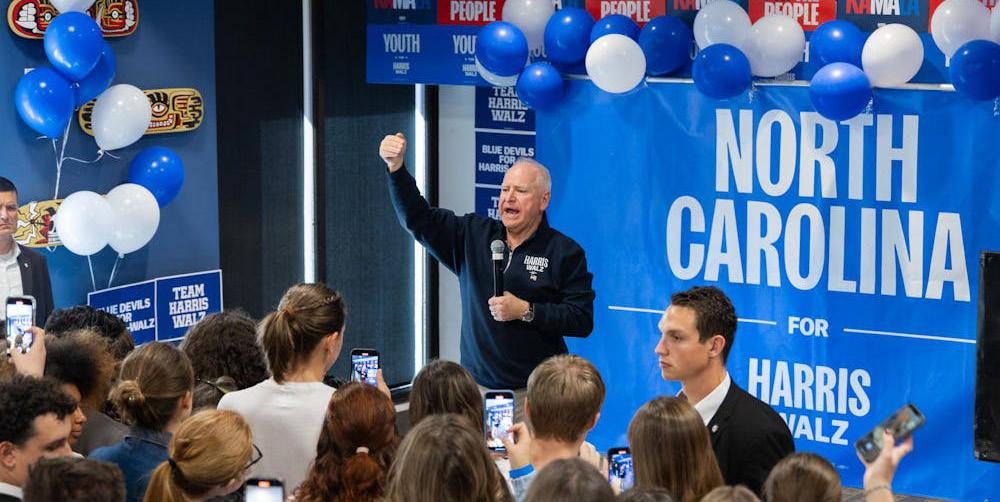
By Abby Spiller Oct. 24, 2024
Editor-in-Chief
Minnesota Gov. Tim Walz spoke on the Harris-Walz campaign’s promise of a “better way forward” in a Thursday “Get Out The Vote” event organized by Duke Democrats in the Bryan Center.
The BC Landing, adorned with a sea of “Blue Devils for Harris-Walz” signs and overlooked by Secret Service agents, hosted over 150 community members to hear the vice presidential pick speak on the importance of voting in North Carolina this election. Walz visited the swing state just last week alongside former President Bill Clinton to kick off the early voting period.
“Right now, we're not talking about the next four years,” Walz said of the election’s impact. “We’re talking about the next 40 years.”
Throughout his eight-minute speech, Walz touched on policy issues including reproductive rights and climate change and underscored the dangers of a second Trump presidency.
“We see [Vice President] Kamala Harris with a to-do list for this country that is the to-do list that Americans want, [but] we see Donald Trump with a grievances list,” Walz said, adding that “the contrast” between the candidates “couldn’t be greater.”
He further emphasized Harris' intention to “be [a] president for all Americans,” and implement policies that benefit all her
constituents, regardless of which candidate they voted for.
Harris underscored this approach herself during a Wednesday CNN town hall in an effort to engage with undecided voters.
“There are 12 days to choose dignity, integrity and kindness,” Walz said. “… It is not about our ideology … [but] about the people [and] the policies that work.”
He specifically stated the campaign’s intention to restore the protections provided under Roe v. Wade, claiming that policies implemented by the Trump administration put women’s lives “at risk.”
Walz continued by emphasizing the historical significance of this year’s election.
“[When you’re my age], you’re going to be asked … ‘what did you do?’” he said. “And your answer is going to be ‘every damn thing possible.”
Walz was introduced by Duke Democrats President Annika Aristimuno, a junior, who spoke on the energy of young voters in the election.
“We’ve all been told that our generation will shape the future,” she said. “… Well, now is the time … It is going to take all of our collective action to organize our community to make sure that Gov. Tim Walz goes from being Kamala Harris’ running mate to the next vice president of the United States.”
Aristimuno also called on students to head to the polls to cast their ballots.
Students can vote early at the Karsh Alumni and Visitors Center up until Nov. 2. Same-day registration is available during the
early voting period. On Election Day, students who are already registered in North Carolina can vote at their designated polling location.
Ahead of the event, the University announced that there would be restricted access and increased security in the Bryan Center. Only those with DukeCard access were permitted to enter the building, and all entering the building were subject to bag checks.
Following his speech, Walz headed to Cameron Indoor Stadium, where he met with Nina King, vice president and director of athletics, and Jon Scheyer, Duke men’s basketball head coach.
Walz concluded his fourth visit to the state with stops in Greenville and Wilmington.
“This election will run right through North Carolina,” Walz said. “And if North Carolina … goes for Kamala Harris, we win this election.”
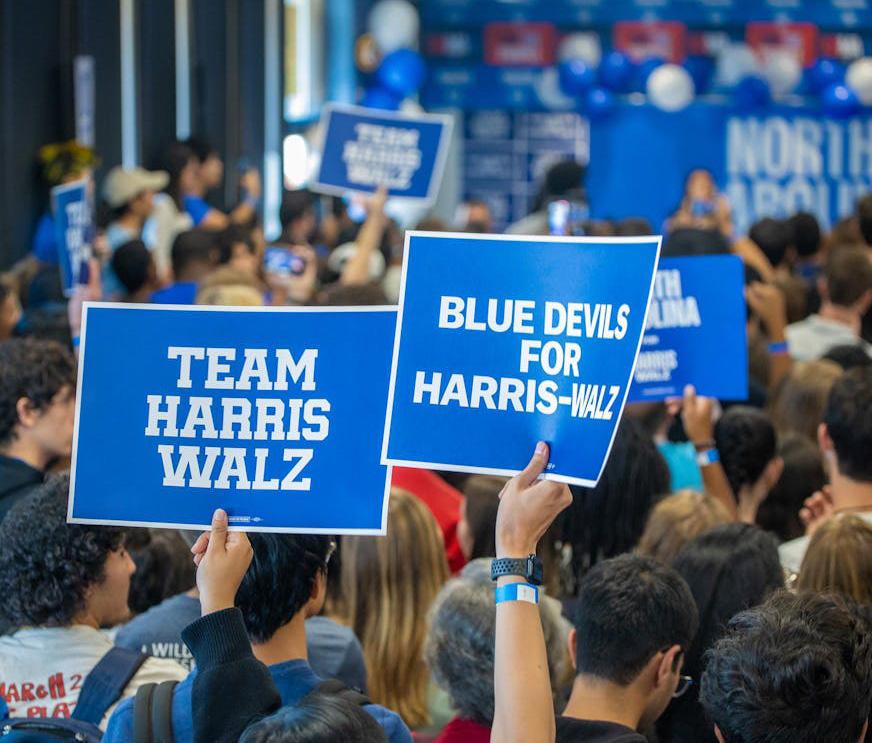
By Rae Rackley July 31, 2024
Staff Reporter
Less than four months before Election Day, President Joe Biden announced July 21 he was ending his campaign as the presumptive Democratic presidential nominee. He then endorsed Vice President Kamala Harris, who is now the front-runner for the Democratic Party’s fight against Republican nominee Donald Trump.
Harris confirmed her intention to run for president in a statement later that afternoon, praising Biden for his “selfless and patriotic act” and thanking him for endorsing her candidacy.
"My intention is to earn and win this nomination," she wrote. "… I will do everything in my power to unite the Democratic Party — and unite our nation — to defeat Donald Trump and his extreme Project 2025 agenda."
Biden’s decision to end his candidacy so close to a national convention is unprecedented in modern American politics. However, this dramatic shift has largely transformed the Democratic Party’s concerns about Biden’s mental acuity into unified support for Harris as their next presidential nominee.
Harris was the only Democratic candidate to publicly announce she was seeking the nomination after Biden ended his bid. According to an Associated Press Survey, Harris had gained the support of enough Democratic National Convention delegates to secure her spot as the party’s nominee by July 23.
Meanwhile, Harris’ opponent now faces the challenge of addressing a newer, younger,
female candidate. The Trump campaign had already pivoted their strategy in the first week since Harris announced her bid to challenge her political standing, namely by targeting her handling of immigration policy at the southern border and attempting to discredit her identity as a Black woman.
As the country adapts to this monumental development in the lead-up to November’s election, The Chronicle interviewed members of the Duke community to gauge reactions to Biden’s historic act.
“[Biden] made an impossibly hard decision, and I think it was the right decision,” said Asher Hildebrand, director of graduate studies and professor of the practice in the Sanford School of Policy.
Hildebrand spent 15 years working in government and politics, serving as chief of staff for Rep. David Price, D-N.C., and director of policy and research for thenPresident Barack Obama's 2012 reelection campaign in North Carolina.
Although Hildebrand believes Biden had not definitively lost all hope of winning the election when he dropped out, he acknowledged that the then-candidate’s path to victory was “narrowing and perhaps closing,” especially in light of polling in the final days of Biden’s campaign showing him trailing Trump in every major swing state and even “at risk of falling behind in a series of states that should be solidly Democratic.”
Sophomore Ariona Miller agreed that Biden leaving the race was “the best move that he could have made for the country and for the party.”
Miller is an intern for Durham Democrats and a member of Students for Harris. She explained that despite Biden’s strong policy
record from his first term, diminished “public perception” of his capabilities due to signs of his advancing age was tanking his ratings in the polls and dividing support in the Democratic Party.
Endorsing Harris as the next Democratic candidate has “reinvigorated the Democratic base [and] united the party, at least on the surface level” according to sophomore Zoe Farris.
“I think what people really want is change,” Farris said, adding that she thinks Harris represents that change to many. She explained that Harris’ position as a nonincumbent “fresh face” may appeal to many voters, especially younger demographics who Farris believes will “flock to her.”
Hildebrand agreed, explaining that Harris’ background as a 60-year-old woman of color makes her attractive to new audiences of voters and “opens up potential other paths to victory that the Biden campaign didn’t see.”
Hildebrand also noted that the Trump campaign’s reliance on “fighting on the terrain of age and frailty” has been neutralized and even flipped to Democrats’ advantage now with Harris as the new party leader.
The interviewees all agreed that Harris is the obvious choice to replace Biden, though they expressed differing opinions on her favorability as a candidate.
“I don’t know how much I trust Kamala Harris,” Farris said, questioning Harris’ authenticity and competency as a policymaker. She cited her complicated history as a prosecutor and her role in the southern border crisis as weak points for the candidate.
Hildebrand believes Harris is “fairly moderate” and has already demonstrated her ability to distinguish herself from the
Biden presidency on certain policy issues. He referenced her July 25 meeting with Israeli Prime Minister Benjamin Netanyahu, where she was able to affirm support for Israel while demanding the country mitigate Palestinian suffering in Gaza.
Hildebrand also thinks it is unavoidable that Harris has been “saddled by” certain Biden administration policies early on in her campaign, but he asserted that she has an opportunity to “draw some distinctions with Biden on a number of issues” and make a name for herself.
All interviewees agreed that both candidates should focus on outlining their policy solutions rather than resorting to personal attacks.
“Let's talk about policy,” Hildebrand said. “Let's talk about the future, instead of talking about whether the president is too old to do the job.”
Hildebrand thinks Trump will continue to struggle with “trying to rise above petty politics,” something he recently endeavored to do to promote an image of national unity in the immediate aftermath of his July 13 assassination attempt. However, Trump has a history of making sexist and racist comments about Harris, a trend that has continued since she announced her candidacy.
Farris thinks Harris needs to outline policy solutions to issues surrounding the economy and immigration that appeal to moderate and independent voters.
Miller hopes Harris will take more progressive stances than Biden did in dealing with the Israel-Hamas war, attacks on diversity, equity and inclusion efforts, and other social issues.
See HARRIS on Page 11
By Rae Rackley Oct. 15, 2024 Staff Reporter
With the 2024 general election just weeks away, Duke students have stepped up their mobilization efforts in preparation for some tight North Carolina races. But on-campus politics were long missing an important stakeholder: the Duke College Republicans.
Amid ongoing ideological tensions within the Republican Party and increased calls for ideological diversity in higher education, Republican mobilization on campus has been almost non-existent.
DCR President Zander Pitrus, a junior, shared that he is tired of Republican students feeling ostracized on campus — leading him to re-establish the club’s presence on campus.
“We are able to defend why we are conservative,” Pitrus said. “We are able to defend our ideas and morals, but people don’t believe that on campus.”
Pitrus announced the club’s formation in a Monday post on the DCR Instagram page, outlining its goals of “advancing the timeless virtues of tolerance, the spirited contest of ideas and civil disagreement through the scope of Republican causes.”
While Duke Democrats has increased its presence on campus in recent years through campaigns to register and educate student voters and phone bank in support of Democratic candidates, its Republican complement had been inactive since 2020.
Pitrus believes unifying and promoting conservative perspectives is essential to protecting free speech and intellectual growth at Duke.
According to The Chronicle's Class of 2027 survey, about 58% of now-sophomores said they were “somewhat” or “very” liberal, while 27.5% identified as moderates and 14.3% identified as “somewhat” conservative or conservative.
This represents an increase in ideological diversity compared to the Class of 2026. In The Chronicle's Class of 2026 Survey, nearly 72% of now-juniors said they were “somewhat” or “very” liberal, while 18% identified as moderates and nearly 10% identified as “somewhat” conservative or conservative.
The liberal imbalance at Duke mirrors a similar national imbalance of liberal professors and students on college campuses, fueling claims by conservative politicians that higher education suffers from a left-leaning bias.
Some have promoted “viewpoint diversity” and “dialogue across difference” as solutions to this imbalance and the accompanying trend of rising political polarization in the United States. Action steps proposed thus far have included increasing the percentage of conservative students and faculty on campus, as well as requiring regular evaluations of professors’ abilities to foster “intellectual diversity” in the classroom.
Duke has instituted a variety of initiatives aimed at fostering intellectual diversity and dialogue across differences, including the Civil Discourse Project, which sponsors courses, events and scholarships that promote bipartisan conversations. The administration also recently charged a new faculty committee with reevaluating the University’s policy on
academic freedom, which has not been updated since 1976.
The 2020 dissolution of Duke College Republicans
Duke College Republicans disbanded in 2020 due to ideological tensions within the group. These tensions reflected larger ideological debates within the Republican Party surrounding the clash between traditional conservatism and Trump’s populism.
In 2016, Duke College Republicans chose to abstain from endorsing Republican presidential nominee Donald Trump. Five DCR members came out with a statement against him. At the time, College Republican clubs around the nation were divided over whether to endorse Trump.
According to Peter Feaver, professor of political science and former faculty adviser for DCR, the club “found it really difficult to navigate the Trump years and finally just collapsed” in the fall of 2020 during Trump’s reelection campaign.
In a 2020 Chronicle article, former DCR member Karl Harrison, Trinity ‘20, described the dissolution of the club as a result of tensions as a split between social conservatives and economic conservatives in the club.
Feaver distanced himself from the club due to his opposition to Trump. He identifies as a “real Republican” who is “not completely at home in the current Republican Party.” He believes Trump’s rise to power has weakened the party’s values and capabilities, asserting that once Trump “pass[es] from the political scene,” it can rebuild to become more “healthy.”
Pitrus claims that Trump is a “more moderate candidate” than the media has portrayed him to be and that the former president did not “undermine” democratic processes on Jan. 6.
“It would be better for Duke and it would be better for Duke students if there was a richer menu of intellectual diversity to include political diversity."
Duke College Republicans reborn Pitrus restarted Duke College Republicans to give Republican students a space on campus to unite around shared conservative values and support the election of Republican candidates.
According to Pitrus, “left-leaning” professor Abdullah Antepli, professor of the practice in the Sanford School of Public Policy, has agreed to be DCR’s faculty adviser. Pitrus referred to Antepli as students’ “last beacon of hope for free speech” on campus, claiming that Duke suffers from “a lack of conservative faculty.”
Pitrus follows the Duke Students for Trump Instagram account, which he says is the only semblance of Republican mobilization at Duke this election season.
According to him, although it has served as an anonymous outlet where students can express their support for Trump without being “afraid of sharing those perspectives,” the account “doesn’t really serve a great purpose if there isn’t an organization on campus” to host these students.
“The founder of Duke Students for Trump is actually extremely afraid of expressing his identity, which is also an issue,” Pitrus said.
“It 's important that … people are challenged in their beliefs — or else there would be no purpose of education at all."
He noted that the account does not represent a formal organization on campus, adding that he wanted to revive the Duke College Republicans to create a space where Republicans can share their perspectives with like-minded peers.
Although Pitrus hopes that members of the club would support Trump as this year’s Republican presidential nominee, he is accepting of the fact that many members might not agree with some of the former president’s actions or even vote for him this fall.
He wants the club to be a place where all members feel free to express their political beliefs, recognizing that ideological differences exist among conservatives and advocating for members to “embrace those differences.” Pitrus also aims to “engage with people from the opposing side” of an issue — including the liberal majority on campus, who he thinks would benefit from challenges to their views.
“I’m actually concerned for liberals on campus because they come to this institution and their beliefs are constantly reaffirmed by their peers and professors and administrators and not challenged in any sense,” he said. “When you go out in the real world, you have no idea of how to have a constructive conversation with people and [have] constructive disagreement.”
While some faculty have identified a perceived lack of ideological diversity on campus, it remains unclear whether the problem is rooted in a lack of conservative representation on campus or existing conservative perspectives being stifled by the dominance of liberal rhetoric in higher education.
“It would be better for Duke and it would be better for Duke students if there was a richer menu of intellectual diversity to include political diversity” Feaver said. He finds it unfortunate that the political diversity at Duke is nowhere near the national representation.
However, Feaver thinks that “given how little viewpoint diversity there is among the faculty, Duke is managing the environment reasonably well.” As director of the Duke Program in American Grand Strategy, he
invites speakers with diverse political views to engage with a Duke audience.
Still, Feaver struggles as one of the only conservative faculty members, sharing that he is “tokenized and forced to stand in for others” in on-campus media and events as a conservative faculty member. Yet, he continues to voice his perspective to stand up for conservative students “who feel like their voice is suppressed or at least marginalized.”
“I wish I had more conservative students. I wish I had more conservative colleagues,” said Eric Mlyn, lecturer in the Sanford School who promotes the importance of bipartisan discourse on campus.
Pitrus thinks there are an adequate number of Republicans on campus, but they are afraid to express their opinions in Duke’s political climate. He feels many liberal students and faculty dismiss Republican perspectives as less “intellectually capable” without hearing them out and claimed that administrators tend to support this dismissal.
“[Administrators] claim to support civil dialogue by bringing in people like Liz Cheney … who they know is going to endorse a Democratic candidate,” he said. “They aren’t going to bring someone who’s pro-Trump to this campus, and they never have.”
Pitrus later clarified his view that while the University may bring Trump supporters to campus, they are not asked to speak about their endorsement of the former president.
While Mlyn agrees Duke should let election deniers speak on campus, he thinks hiring one to teach public policy or political science raises complicated questions about academic integrity.
“How can we let someone who teaches that the 2020 election was stolen be deemed an expert by our University when all subject experts, the courts and many from the Trump administration reject this [Make America Great Again] narrative as absurd?” he asked.
While proponents of viewpoint diversity believe it enriches the pursuit of knowledge for all, many leaders on college campuses worry it has been weaponized by far-right politicians as a means of undermining racial and ethnic diversity efforts.
In May, the University of North Carolina System’s Board of Trustees voted to strip $2.3 million of state funding from DEI initiatives, preceding a September announcement of system-wide program cuts. Duke students expressed disappointment at the move, and some reflected on what they viewed as “empty gestures” by University administration to promote DEI on Duke’s campus.
In light of these concerns, Mlyn believes it is important to “talk about inclusion in the broadest possible sense.” He thinks Duke should prioritize racial, ethnic, economic and political diversity on campus, whether through recruitment of students and faculty or through academic instruction.
Feaver understands where these concerns are coming from. However, he thinks if Duke doesn't act now to increase the representation of conservative views on campus, it will “seem to be an inhospitable environment for intellectual debate.”
“We're all on this intellectual pursuit, and it's important that in this pursuit, people are challenged in their beliefs — or else there would be no purpose of education at all,” Pitrus said.
By Rae Rackley Aprili 10, 2024 Staff Reporter
As the 2024 presidential election approaches, what voting patterns can be expected from Duke students? The Chronicle looked into past voting landscapes at Duke to get some answers.
The University's latest student voter engagement report, which analyzed voting trends from 2020, reveals a mixed landscape of above-average participation in national elections alongside gaps in data regarding student demographics and local voting habits.
This data compares Duke’s voter engagement to the more than 1,200 other participating institutions.
Duke’s voting rate
The University’s overall voting rate — the percentage of eligible students who voted on Election Day — during the 2020 presidential elections was 70.2%, 4.2% greater than the 66% average across all institutions, according to data from The National Study of Learning, Voting and Engagement conducted by the Institute for Democracy and Higher Education at Tufts University. Student voting habits exhibited a similar trend in the 2016 and 2018 midterm elections.
In the NSLVE, a univer sity’s voting rate is the product of two met rics: registration rate and yield rate. The registration rate is the percentage of eligible students who are registered to vote. The yield rate is the percentage of registered students who actually voted on Election Day. The product re flects the total percentage of eligible students who voted, and provides the most holistic metric of the university’s voter engagement.
increased by 14.5% from 2016 to 2020, rising to 70.2%, about 4% higher than the national average of 66%.
When compared only to private four-year institutions, Duke’s rate in 2020 was just 0.2 percentage points above the 70% average.
Voter turnout based on age
Duke students who were 18 to 21 years old surpassed those who were 22 to 24 years old in voter turnout in the 2020 elections. These two age groups make up the majority of enrolled Duke students.
Students who were 18 to 21 years old had a 65% voting rate, while those who were 22 to 24 years old had a 41% voting rate.
The University’s youngest students also proportionally outvoted students aged 25 to 29 and aged 30 to 39 in both the 2016 and 2020 elections. A higher proportion of older voters at Duke voted in the 2018 midterm elections.
The 40- to 49-year-old and 50+ age groups consistently outvoted their younger counterparts. Although these age groups comprise the smallest portion of Duke students, their engagement numbers remain the highest.
Missing data: race/ethnicity, sex and local election voting habits
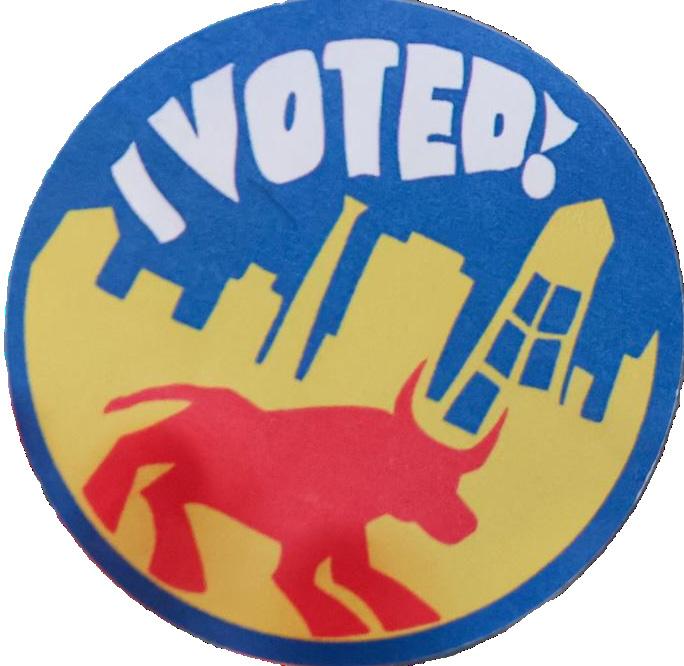
Over the three election cycles included in the report, Duke’s voter registration rate was below average. However, since its yield rate outpaced other institutions, its voting rate was situated above the national average.
In 2020, the University had a registration rate of 79% compared to the 82% national average. When the comparison pool is narrowed to only include private, four-year institutions, Duke’s statistics fall even lower compared to the average. However, this reflects an improvement from the University’s 14.1% differential from the average in 2018 and 7.6% in 2016.
However, Duke’s yield rate stood at 88.8%, significantly higher than the national average of 80%.
Even during the 2018 midterm elections, which historically have lower voting rates than presidential elections, the University’s 64.5% yield rate was almost 12 percentage points higher than the national average of 53%.
The University’s student voting rate, the product of the registration and yield rates,
ciate vice provost and university registrar. “This means that we are always mindful of the sensitivity of our student data and try to avoid sending sensitive information whenever possible.”
The Institute points out that, without race/ethnicity data, there is no way to report equity gaps in students’ turnout rates.
To promote equitable political mobility, Gismondi said it is important that “campuses make every ef fort to report as com plete data as pos sible … [since] it allows you to have more of a comprehensive context to how your institution is doing on issues of political learning and democratic engagement.”
Factors driving voting and yield rates
Universities have historically struggled to improve student “yield” rates, but Duke stands out as an anomaly.
“It seems to be easier to get students to register to vote than it is to get them to actually turn out to vote” due to the structural and internal barriers students face, Gismondi said.
Duke’s voter yield rates “jumped out” to Gismondi as something the University is “doing really well,” despite the complex internal and external barriers to student voting.
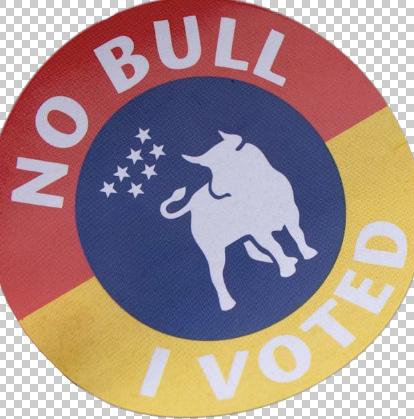
The University's Government Relations Office collaborated with the Durham Board of Elections to set up Karsh as an on-campus early voting site.
While highly informative, NSLVE data only provides a partial picture of democratic engagement at the University. Other factors, such as race and ethnicity, gender and voting location are not included. Local election voting rates are also not included in the report.
“We’ve had several pushes over the years to campuses trying to communicate the importance of them reporting that [race/ethnicity] data,” said NSLVE Director Adam Gismondi. He added that since reporting demographic data to the National Student Clearinghouse is optional, many universities choose simply not to report it.
“Our data structure is purpose-built only to send student information needed for federal compliance,” wrote Frank Blalark, asso-
Local elections are “undervalued and underrated,” according to senior Pilar Kelly, student voting coordinator of Duke Votes. She added that the extent of students' involvement in local politics remains unclear.
According to Blalark, the University has never collected data on municipal elections.
Only 1,543 voters aged 18 to 25 cast their votes in Durham's municipal election in November 2023. However, without data on the proportion of students registered to vote locally versus in their home state, a full understanding of local voting habits remains incomplete.
These seemingly low engagement numbers may be due in part to a lack of on-campus voting.
“We don't have early voting for local elections, that was an issue,” Kelly said.
According to Kelly, student voter turnout may increase if the Karsh Alumni and Visitors Center becomes an early voting site, since it would be more accessible to students without cars.
“It would be great if we could propose a project to learn more about the voting patterns within our student academic community,” Blalark wrote.
The Office of Government Relations also supports Duke Votes, a student-run initiative that provides online and inperson resources to educate, register and mobilize students and staff to vote. Duke Votes has disseminated Student Voter IDs, run in-person presentations, hosted registration drives and more to provide pathways to voting.
“It's definitely a priority of Duke, for us to make sure that we're providing students with all of the resources they need about registering to vote, whether it's in North Carolina or in their home state,” said Katie Lipe, assistant director for state relations.
Kelly said Duke Votes helps answer students' questions such as “'What do I do if I'm from out of state?’ ‘Can I even vote here?’ ‘Do I need an ID?’” She said that voting is “complicated and mystifying” due to North Carolina’s new voter ID and precinct laws.
Although she worries about the impact of new barriers to student voting, Kelly is optimistic that Duke Votes and other grassroots organizations will continue to successfully get out the vote in 2024.
“There’s going to be a lot of activity, a lot of energy again by people that are really excited to vote again,” she said. “... I think there is going to be a lot of people going out to the polls voting in their first presidential election.”
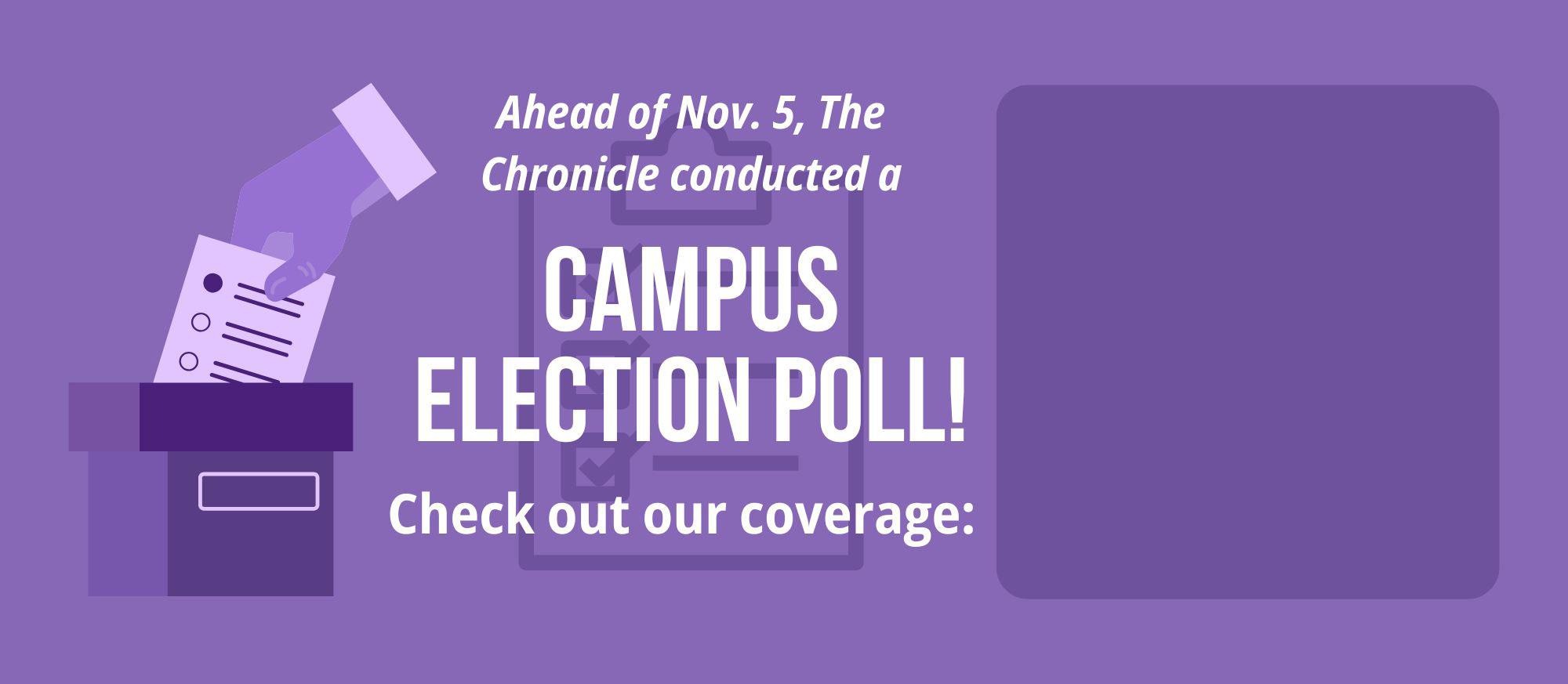

By Winston Qian Oct. 20, 2024 Health/Science Editor
Just four days into early voting, 1,008,123 North Carolinians had cast their ballots, marking an all-time record turnout for the state.
The over 1 million votes account for roughly 13% of the state’s 7.8 million registered voters. Of the votes, 916,433 were cast in person. Of the remaining 91,690 absentee votes, 77,831 were cast by civilians, 11,168 by overseas voters and 2,691 by the military.
On Oct. 17 alone — the first day of early voting — 353,166 voters cast their ballots, marking a 1.3% increase from the 348,559 voter turnout in 2020.
Duke's on-campus polling location, the Karsh Alumni and Visitors Center, was one of the most active in Durham County, with 1,175 voters casting their ballots on the first day alone. By the evening of Oct. 20, 3,571 people had voted at Duke.
In western parts of the state hit by Hurricane Helene in late September, 76 of the 80 early voting sites were open beginning Oct. 17.
As of Oct. 20, Republican presidential nominee Donald Trump held a narrow 0.5 percentage point lead in North Carolina’s
polls. It is unclear whether the record turnout benefits the former president or Democratic presidential nominee Kamala Harris.
According to the University’s latest student voter engagement report conducted in October 2021, early voter turnout increased 33 percentage points from 2016 to 2020. The overall student voting rate between those years also marked an increase of 14.5 percentage points from 55.7% to 70.2%.
Students planning to vote early can cast their ballot at the Karsh Alumni and Visitors Center from 8 a.m. to 7:30 p.m. Mondays through Saturdays and 2 p.m. to 7:30 p.m. on Sundays up until Nov. 2 at 3 p.m. They must present a valid photo ID such as a DukeCard, driver’s license or U.S. passport.
Same-day registration is also available for students who have not yet registered. Those who would like to do so must show proof of residence, which they can do by presenting a document from the University including their name and housing address.
Students can check their registration status and access a sample ballot with the list of candidates and ballot referenda on the North Carolina State Board of Elections website.
BY AVIV STABINSKY | 10/21/2024
Student organizations at Duke — partisan and otherwise — are ramping up their efforts to mobilize voters on campus ahead of the 2024 general election.
Former Congresswoman Liz Cheney says she will vote for Kamala Harris at Duke event
BY MICHAEL AUSTIN, ZOE KOLENOVSKY AND AVA LITTMAN |
09/04/2024
"Not only am I not voting for Donald Trump, but I will be voting for Kamala Harris," Cheney said to a standing ovation in Page Auditorium.

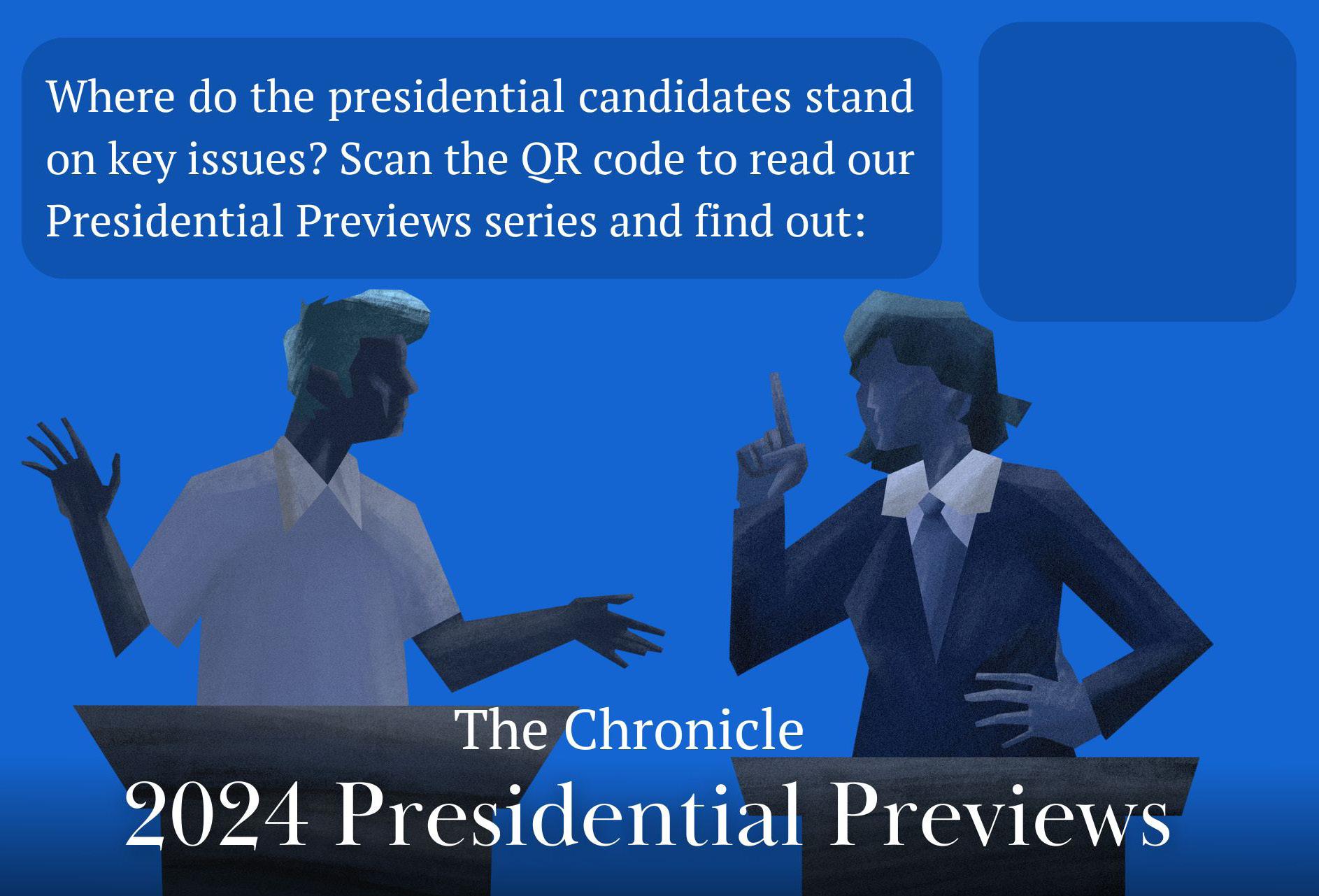
By Dylan Halper and Melanie Shao Sept. 9, 2024
Staff Reporter and Contributing Writer
Duke reversed a fall 2023 decision to make the DukeCard fully digital in a move ensuring that the cards comply with North Carolina’s new voter identification requirement.
Last year’s decision marked an effort by the University to reduce the cards’ environmental impact. However, after a failed attempt by Duke to have the mobile DukeCard approved as an acceptable photo ID by the North Carolina State Board of Elections, the University moved to issue physical cards to the Class of 2028.
The University of North Carolina at Chapel Hill’s mobile ID card was approved by the NCSBE as an acceptable form of photo ID.
The state legislature first passed a photo ID requirement in 2018, but it was soon struck down by the Democrat-controlled N.C. Supreme Court. However, a Republicancontrolled court overturned the decision last year, meaning this November marks the first time North Carolinians must adhere to the policy in a general election.
“We decided to pre-print that card for the first-years as an easy way to get that out to all the students that may need it for voting,” said Debbie DeYulia, director of DukeCard services and program management.
Last year, the DukeCard Office worked with Duke Votes to create a Student Voter ID, which included
an expiration date and was approved by the NCBOE in July 2023. Students were able to request a card to use in the 2023 municipal election, as well as the 2024 primary and general elections.
DeYulia explained that “because that voter ID card was approved, any physical DukeCard that someone has — even without the expiration date — is also kind of grandfathered in to also be used at the polls,” meaning students can use their regular physical DukeCard as an acceptable photo ID to vote.
DukeCards are the main form of identification for students, allowing them to access buildings on campus and use their deposited funds for amenities like dining and laundry.
When Duke made the switch to mobile cards last year, access to physical cards was limited for the Class of 2027 to those who were either unable to download the Mobile DukeCard because their devices did not meet minimum requirements or needed

access to a “specific lab or Health System building which requires a Prox DukeCard,” according to an August 22, 2023, email from the DukeCard Office sent out to the thenincoming students.
Sophomores without the physical cards said they had not received any communication from the University as of Sept. 9 on how to obtain a physical DukeCard before Election Day.
“That's really confusing for me because I am registered in North Carolina, but I don't have a N.C. ID, so I would need that physical DukeCard to vote,” said sophomore Pranav Hooda.
Later that month, the DukeCard Office partnered with Duke Votes to distribute IDonly DukeCards to students ahead of Election Day. DeYulia clarified that the IDs will not be fully functioning DukeCards to be used to access on-campus services.
Cards are available in Bryan Center 101 between 9 a.m. and 5 p.m. through Nov. 5. Students must present a government-issued ID to one of the representatives. The DukeCard Office did not print IDs for last year’s 56 transfer students.
Beyond voting, some first-years have found minimal uses for their physical DukeCard.
“I think it serves no purpose … it's annoying to carry around,” said first-year David Colin. “When they handed it out, they literally said … ‘this is a souvenir.’”
However, first-year Julia Zheng stated that the DukeCard was helpful for getting discounts at nearby stores where you have to “prove that you're a Duke student.”
Sophomore Bo Groff expressed frustration at not being able to access such off-campus
discounts because sophomores were not given physical cards. He also explained that he needed his DukeCard to access his room in Trinity dorm, which often presented an inconvenience.
“If I just wanted to go study or go to the bathroom, I had to bring my phone with me, and if I did forget it in my room, I would have to … get a hold of my roommate somehow or my RA to get back into the room,” Groff said.
Hooda echoed Groff’s sentiment, saying he hoped there would be a way to obtain a physical DukeCard that possessed all the capacities of the mobile one.
“For example, if I wanted my friend to go get food for me or something, I could just give him my DukeCard rather than giving him my entire phone,” Hooda said.
However, the return to a physical DukeCard raises the issue of sustainability, one of the primary reasons DukeCard went digital last year.
According to the DukeCard website, mobile credentials “reduce the impact of plastic badges, printers, ink, storage and handling on our environment.” The site also claims that switching to digital IDs saves 5.2 tons of plastic cards from being discarded and is 9398% more energy-efficient.
DeYulia said the DukeCard Office is continuing to work to get the mobile card approved for voter identification “so that [the University doesn’t] have to continue to print the cards.”
Editor’s note: Portions of this story were updated for print.
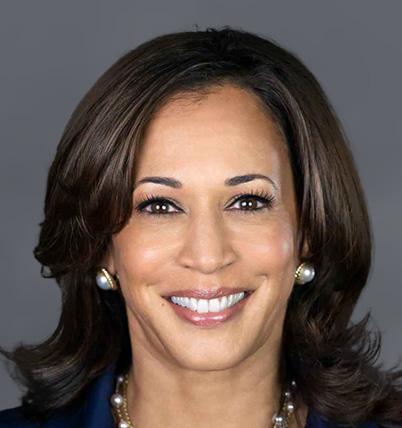
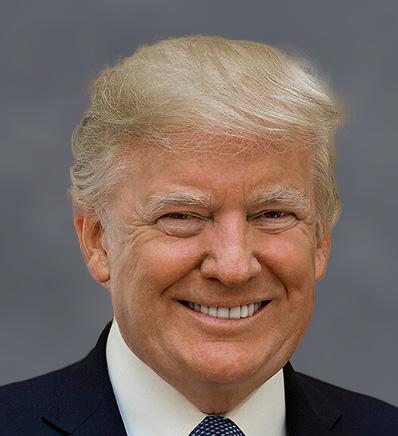
See guides.vote for online guides with links & source
ABORTION
Ban or legal?
CLIMATE CHANGE
Should climate change be a top priority?
CRIMINAL JUSTICE
How to ensure effectiveness and fairness in law enforcement?
How to improve the economy and make daily life more affordable.
kamalaharris.com
Legal. “Every woman should have the right to make decisions about her own body.” “This fight is about freedom.” With Biden, strengthened abortion pill access and abortion patient protections, overturned Trump Planned Parenthood federal funding ban. Would sign national abortion rights bill if Congress passed.
Yes. We’re seeing the climate crisis “every day…in real time.“ “We must do more.” Cast the deciding vote to commit $369 billion to climate and clean energy, the biggest investment in US history. Supported $1.2 trillion in infrastructure; includes reducing greenhouse gas emissions. No longer would ban hydraulic fracking.
Police are dedicated public servants. As a prosecutor increased felony convictions by one third. But “public safety requires community trust.” Has supported better training, banning choke holds, and prosecuting police misconduct.
Expand child tax credit. Give tax credits for affordable housing builders and subsidize first-time home buyers. Restrict price gouging on groceries and lower drug costs by negotiating prices. Supported bipartisan infrastructure bill.
Limit teaching about racism and gender identity? No. In Florida “extremists… passed a law, ‘Don’t Say Gay,’ trying to instill fear in our teachers.” Now, “they want to replace history with lies,” teaching “that enslaved people benefited from slavery.” Children should be “taught the truth.”
Did Joe Biden win the 2020 Presidential election?
Loosen or tighten gun regulations?
Repeal or expand the Affordable Care Act (ACA), also known as Obamacare?
Yes. “The [election] results were certified by state after state and reaffirmed by court after court.” “On January 6, we all saw what our nation would look like if the forces who seek to dismantle our democracy are successful.”
Tighten. “Every person deserves the freedom to live safe from gun violence.” Supported the bipartisan gun safety bill and required background checks for gun show & online sales.
Expand. “Health care is a right, not a privilege.” Cast a tie-breaking Senate vote to expand ACA & lower Medicare drug prices, including a $35 monthly insulin cost. Would link drug costs to costs that comparable wealthy nations pay.
donaldjtrump.com
Ban. “After 50 years of failure, I was able to kill Roe v. Wade.” Did so by appointing three anti-abortion Supreme Court Justices. It was “a miracle.” States should decide for themselves, potentially monitoring women’s pregnancies and prosecuting women for getting abortions. Abortion is “really not that big of an issue.”
No. Climate change is a “hoax.” The world will “start getting cooler.” Withdrew from the Paris climate pact. Will expand coal and oil production. “I want to drill, baby, drill.” Asked oil and gas executives to donate $1 billion so he could reverse Biden’s climate initiatives.
Police are “under siege.” Cut back active federal oversight of excess force, though supported a database to track it. Admires Chinese approach of quick trials and a death penalty for drug dealers so there will be a “zero drug problem.”
Increase taxes (tariffs) on imported goods. Cut housing demand with mass deportations. To lower prices, would deregulate businesses, rein in “wasteful federal spending” and unleash American energy. Opposed infrastructure bill.
Yes. Certify teachers who “embrace patriotic values.” Would “cut federal funding” for any school “pushing critical race theory, gender ideology.” Restricted diversity training for federal employees and contractors.
No. Called the election a “Big Lie” and a “Massive Fraud” that would justify “termination” of parts of Constitution. Called those who stormed U.S. Capitol “unbelievable patriots.” Would pardon them fully.
Loosen. To NRA, “no one will lay a finger on your firearms.” Plans to roll back Biden gun restrictions. Reversed Obama-era background checks for those with mental illnesses.
Repeal. “Terminate.” “Obamacare is a catastrophe.” As President, promised to replace it with “something terrific,” but repeal failed in the Senate by one vote. Supported an unsuccessful lawsuit to overturn it.
IMMIGRATION
How to handle immigration?
Support a path to citizenship for “DACA” participants brought to the US as children?
ISRAEL/GAZA
Response to Israel’s invasion of Gaza following October Hamas attack?
LABOR
Make it easier or harder for unions to organize?
LGBTQ RIGHTS
Limit or expand LGBTQ rights?
MARIJUANA
Ban or legal?
MINIMUM WAGE
Raise federal minimum from $7.25 an hour?
SOCIAL SECURITY
Cut Social Security or raise retirement age to stabilize program?
STUDENT FINANCIAL AID
Support lowering interest on student loans and/or forgiving them?
TAXES
Raise or lower taxes on the wealthy and corporations?
Support defending Ukraine against Russian invasion?
VOTING RULES
Make voting harder or easier?
HARRIS (D)
Supports “comprehensive immigration reform.” Backed the bipartisan Senate border security bill. Rejects mass deportation of undocumented immigrants. “We are a nation of immigrants…. let us all address [the issue] with the urgency and seriousness it requires.” Supports pathways to citizenship for DACA participants and undocumented spouses of citizens.
“We need” a cease-fire & a two-state solution. “Israel has a right to defend itself.” But “too many innocent Palestinians have been killed… Civilian suffering… [is] devastating.” Palestinians and Israelis both “are entitled to security.”
Easier. “Unions built” the American middle class. “We are fighting to protect the sacred right to organize.” Backs pro-union laws. Walked UAW picket line. Build “an economy where every person, not just the wealthy,” can thrive.
Expand. In 2004, officiated some of the nation’s first same-sex marriages. Helped repeal California’s antigay marriage initiative. Biden administration protected LGBTQ medical patients from discrimination.
Legal. “Nobody should have to go to jail for smoking weed.” Legalize and regulate. Supports Biden’s easing federal prohibition.
Yes. Supports Congress raising the national minimum wage to $15. Biden administration raised to $15 for federal contractors.
No. Would protect and stabilize Social Security by making wealthier Americans pay into Social Security at the same rate as everyone else; they’d keep paying in above their current $168,600/year income cap.
Yes. Supported Biden forgiving $144 billion for over 4 million borrowers, after the Supreme Court blocked the Biden-Harris $430 billion forgiveness plan.
Raise. Voted against Trump tax cuts, which included the largest corporate cut in US history. Supported increasing corporate tax rates. To boost teacher salaries, proposed raising estate taxes on the very wealthy.
Yes. “Regarding Putin’s unprovoked, unjustified war against Ukraine… we are committed to… defend democratic values and stand up to dictators.”
Easier. Pass bills to protect voting rights and make voting and registration easier. Biden administration directed federal agencies to help people register.
Illegal immigrants are “poisoning the blood of our country.” Will use the National Guard and local police, with possible detention camps, to deport 15 to 20 million illegal immigrants. Opposed the bipartisan Senate immigration bill. Tried to end DACA; Supreme Court overruled. Would renew his Muslim ban and end automatic citizenship for everyone born in US
Has supported Israeli action, “get the job done.” Says Israel releasing images of bombed Gaza buildings loses “the PR war.” Gaza protesters are “raging lunatics and Hamas sympathizers.” Would deport student protesters.
Harder. Made it harder for unions to organize. Restricted federal employee collective bargaining. Praised employers who fire striking workers: “They go on strike…and you say… ‘You’re all gone.’” Striking Auto Workers were “sold down the river by their leadership.”
Limit. Weakened an Obama order protecting LGBTQ federal contractors from discrimination. Banned transgender military servicemembers and ended antidiscrimination protections for transgender patients.
Unclear. It does “significant damage.” Reversed Obama rule to not prosecute in states where legal, but ultimately didn’t prosecute.
No. A $15 minimum wage would “eliminate jobs.” Threatened to veto. Questioned need for a federal minimum wage: let the states decide.
Mostly yes. There’s “a lot you can do in… cutting.” Also flags bad management. Proposed $35 billion cuts in Social Security disability programs. But “will never do anything” to “hurt Social Security.”
No. Called student loan forgiveness “unfair” to those not attending college. Vetoed forgiving loans of defrauded students. Proposed cutting support programs for student borrowers.
Lower. His 2017 tax cut included the largest corporate cuts in US history and major tax cuts for the wealthy. Would extend and expand when they expire in 2025. Raising business taxes “will lead to the destruction of your jobs.”
Mostly no. To end the war, will push Ukraine to give up territory to Russia. Russia should “do whatever the hell they want” to NATO countries that don’t pay enough.
Harder. Has long supported stronger voter ID requirements. Sued to bar ballot drop boxes. Encouraged Republicans to vote early but said early ballots “get lost” or are “phony.”
guides.vote is a nonpartisan effort to show where candidates stand. We do not support or oppose any political party or candidate. We include candidates polling 15% or more; use the QR code on the right for online versions, including links to credible sources and other candidates. Vote411.org offers guides to local races and how to vote. For campuses, see Campus Vote Project’s state-specific guides to student voting rules.

By Ana Despa Oct. 22, 2024 Associate News Editor
As Election Day approaches, all eyes are on North Carolina. However, the state is no stranger to the political spotlight.
While a Republican presidential candidate has carried the state in every election since 1976 — barring 2008 — the margins of victory have been razor thin, threading under 3.7% in the past four election cycles.
To see how politics have evolved in North Carolina over the years, The Chronicle conducted an independent analysis of the state’s voting history using publicly available election data. Our figures were sourced primarily from the North Carolina State Board of Elections, which reports data going back to 2004.
The Chronicle found that voter turnout, shifting demographics and political change from the Trump era will likely be crucial factors influencing the state’s decision this November.
How did North Carolina become a battleground state?
From 1856 to 1964, North Carolina voted Democratic in all but three presidential elections, like much of the South. At the time, the Democratic Party stood for a limited

federal government and opposed Republicanled Reconstruction efforts after the Civil War.
However, following the Great Depression in the early 1930s, Democratic president Franklin D. Roosevelt’s New Deal legislation shifted the party’s platform towards creating a stronger federal government. Despite this change, North Carolina continued to vote Democrat due to its historical ties and its opposition to Reconstruction.
The southern political arena fundamentally changed in the 1960s during the civil rights era.
In contrast to the larger Democratic Party, Southern states expressed opposition to the Civil Rights Movement, particularly after Democratic President Lyndon B. Johnson signed the Civil Rights Act of 1964. Profiting from the rift, the Republican Party launched its “Southern strategy,” solidifying their base of support in the region for decades to come.
By the 1976 election, much of the South had turned red. North Carolina stood out as a ballot-splitting exception, regularly voting Democrat in gubernatorial elections but leaning Republican in presidential ones.
Could North Carolina flip blue this year?
Young voters and Black voters could hold the key. Democrats carried North Carolina twice in the past 12 election cycles — Jimmy Carter in 1976 and Barack Obama in 2008 — also securing the presidency in both instances. Carter’s success was likely influenced by broad dissatisfaction with the Republican Party amid the Vietnam War and the Watergate scandal. Obama’s win, however, showcased an important trend of high turnout among Black voters and young voters — demographics which have supported Democrats at higher rates in recent years. This same trend was seen when President Joe Biden unexpectedly
carried Georgia in the 2020 election.
In 2020, 68% of Black registered voters in North Carolina went to the polls. 92% reported voting for Biden in exit poll data. This election cycle, however, Black voters’ support for the Democratic Party has notably slipped. Cross-Tabs conducted in September by the New York Times and Siena College show that only 84% of N.C. Black likely-voters would vote for Harris.
North Carolina has a higher number of Black voters than the national average, with Black residents making up 21% of the state’s citizen voting age population this election cycle, nine percentage points above the national average. Harris recently announced a plan to provide economic opportunity for Black men, hoping to boost enthusiasm for her campaign among this crucial voting bloc.
Young voter turnout in North Carolina is also above the national average and has been
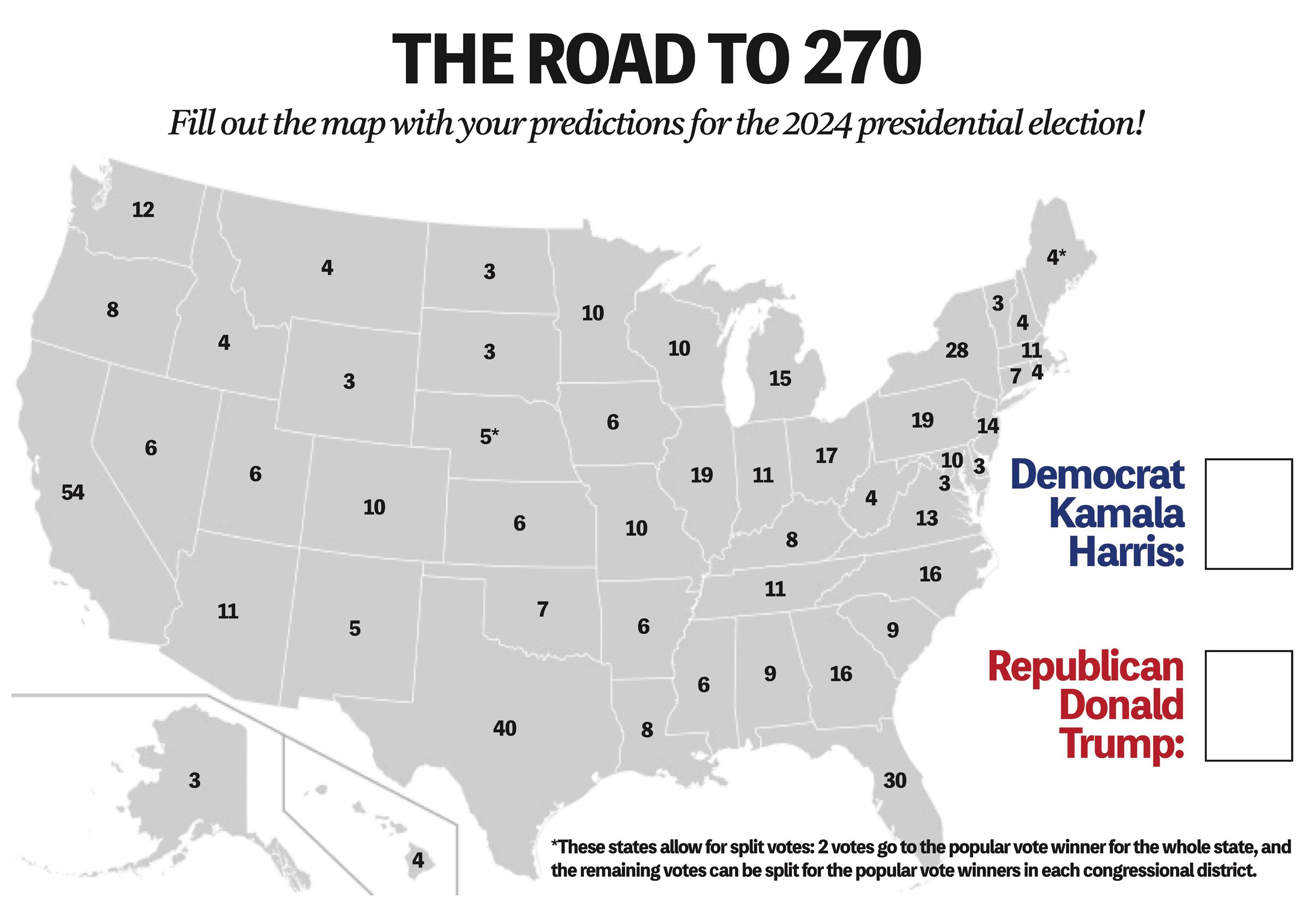
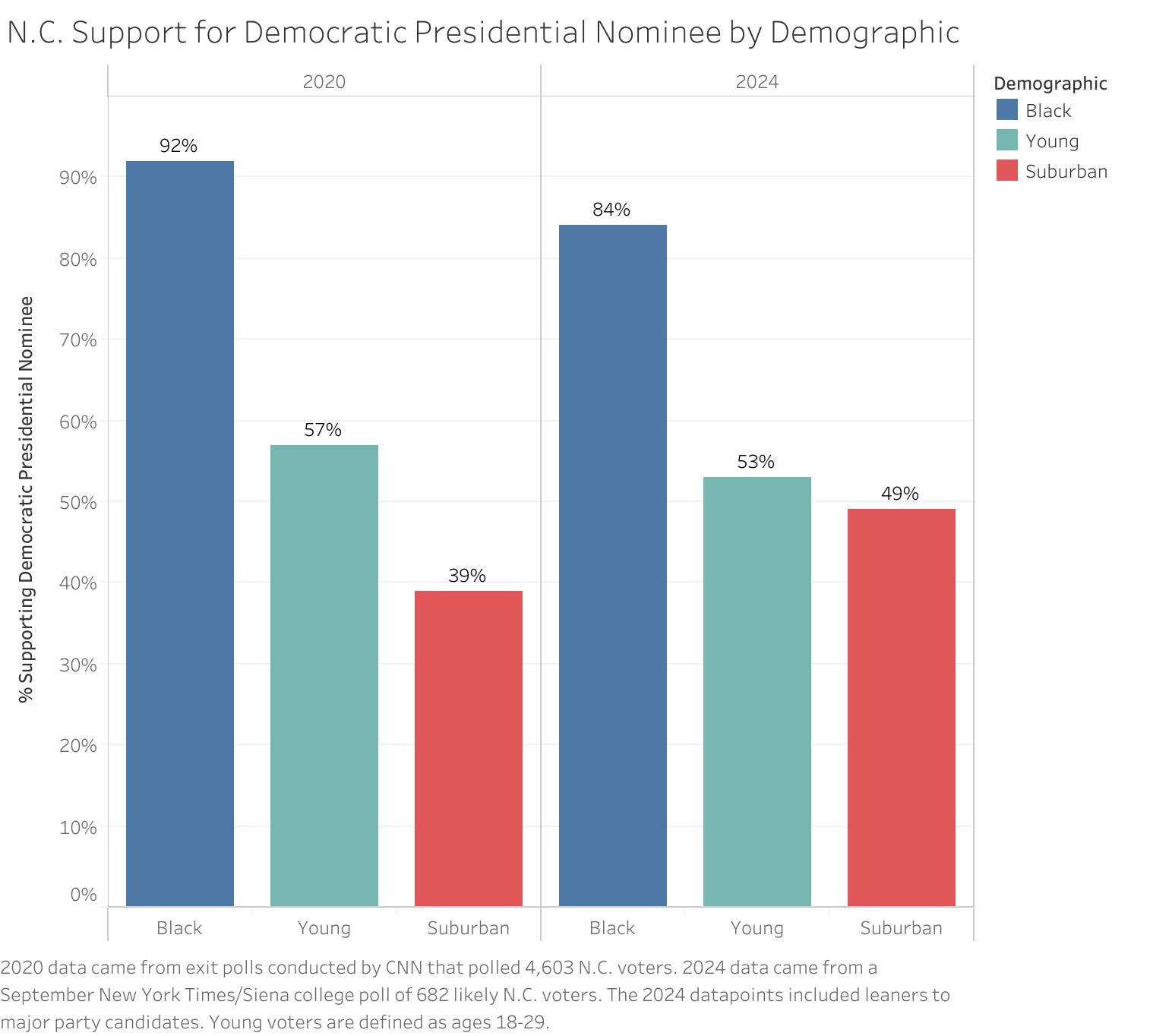
rising over the past several election cycles, though it remains the lowest of any age group. Just 60% of registered voters ages 18 to 25 cast a ballot in the 2020 election, compared to 84.1% of those over the age of 65.
North Carolina’s growing population and demographic shifts could tip the scale.
North Carolina’s voting map shows concentrated pockets of blue amid a sea of red — notably in cities including Charlotte, Raleigh, Durham and Winston-Salem.
Per The Chronicle’s analysis, in the past five election cycles, 16 out of North Carolina’s 100 counties have always voted Democratic, while 65 always went Republican. Five out of the six most densely populated counties have voted Democratic since 2008.
Though, the state’s shifting demographics may influence the extent to which cities vote blue.
Based on 2022 census data, the state’s population has grown 11.7% since 2010, with newcomers disproportionately settling in cities and sprawling into the sub -
urbs. The two most populated counties in the state — Wake and Mecklenburg, which are home to the cities of Raleigh and Charlotte — have seen the largest growth at 29.6% and 24.1%, respectively.
Most newcomers are from Florida, Virginia, South Carolina, New York and California. If these residents vote along traditional urban/rural lines, North Carolina’s urban counties could be tallying even more Democratic ballots this year.
Meanwhile, suburban voters have shifted their political support to Democrats this cycle. The September Cross-Tabs data show that 49% of North Carolina’s suburban voters would vote for Harris, which is a 10 percentage point increase from the number of voters who reported voting for Biden in 2020 exit poll data.
Some historically blue counties flipped during the Trump era, but Republican support was lost in one crucial city.
Trump narrowly won North Carolina in 2016 and 2020, with margins of victory of 3.70% and 1.35%, respectively.
In his first run for office, three counties that had never voted Republican in elections dating back to 2004 — Gates, Richmond and Robeson — turned red. These counties all voted for Trump again in 2020 alongside Scotland County, which also voted blue in elections prior.
The three counties neighbor each other along the eastern side of North Carolina’s border with South Carolina. They are rural counties with shrinking populations that are shifting towards an older demographic. Robeson County — the largest of the three with around 120,000 people — hosts the headquarters of the state-recognized Lumbee tribe, making it a minority-majority county with 38% of its population being Native American. Scotland and Richmond are predominantly white and each have populations of 30,000 to 40,000 people.
Despite significant increases in voter turnout in all three counties, their votes only accounted for 1.51% of all N.C. votes in the 2020 election. Still, in a state projected to be a toss-up, this region’s shift towards Trump may be a factor to track on Nov. 5.
NORTH CAROLINA on Page 11
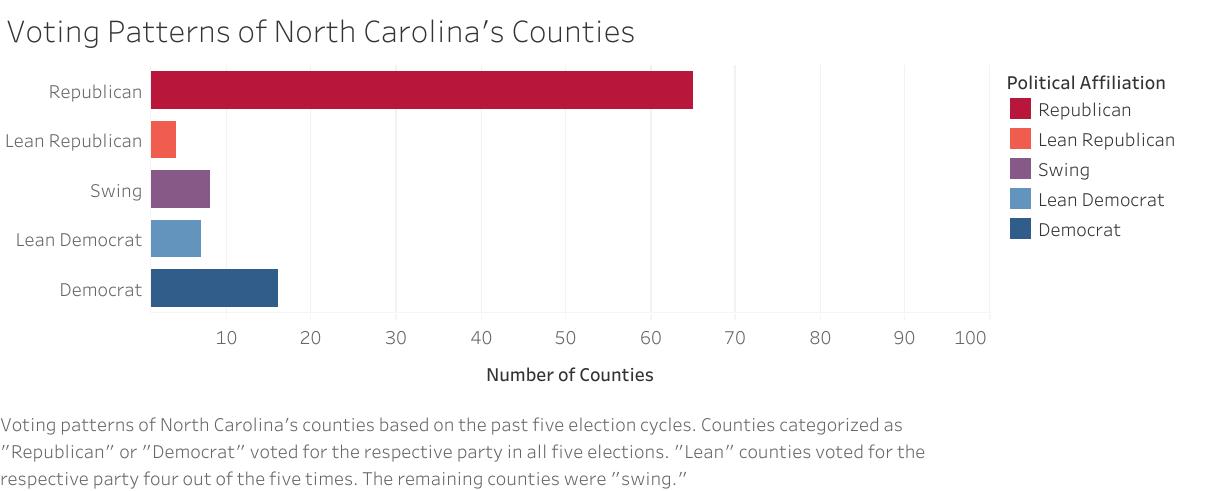
By Zoe Kolenovsky
July 15, 2024
News Editor
Former president Donald Trump faced a reported assassination attempt in July at a campaign rally in Butler, Pennsylvania.
The event marks the most serious assassination attempt of a president or presidential candidate since then-President Ronald Reagan was shot while leaving a speaking engagement in 1981.
In response to public discourse on how this development will impact the upcoming election and the future of American democracy, The Chronicle spoke with three experts from Duke’s public policy and political science departments to gain their insights on the matter.
The shooting
At around 6:15 p.m. July 13, multiple shots were fired from a rooftop near the outdoor rally, per a statement that evening from Anthony Guglielmi, chief of communications for the U.S. Secret Service. Trump’s right ear was reportedly grazed by a bullet, but the presumptive Republican nominee was not seriously injured.
The shooter — 20-year-old Thomas Matthew Crooks of Bethel Park, Pennsylvania — was quickly neutralized by Secret Service agents and was reported dead soon after the event. Crooks’ political affiliation is still unclear, and a motive for the attack has yet to be determined.
At least one bystander was killed, and two others were critically injured.
The event is currently under investigation by the Secret Service, the Federal Bureau of Investigation and the Bureau of Alcohol, Tobacco and Firearms as an assassination attempt on the former president.
“Most importantly, I want to extend my condolences to the family of the person at the rally who was killed, and also to the family of another person that was badly injured,” Trump wrote in a July 13 statement on his social media platform, Truth Social. “It is incredible that such an act can take place in our country.”
President Joe Biden expressed his gratitude for Trump’s well-being in a televised address soon after the shooting, and the two reportedly spoke over the phone later in the evening.
“There’s no place in America for this kind of violence. It’s sick,” Biden said. “… The idea that there’s political violence or violence in America like this is unheard of — it’s just not appropriate. Everybody, everybody must condemn it.”
The president delivered a second address July 14, where he called on the nation to “lower the temperature in our politics” and stated that “violence has never been the answer.” He was joined by American politicians and several world leaders in condemning the show of political violence.
Rising political violence
The question at the top of many Americans’ minds is whether the shooting indicates a
growing trend of political violence. Several of Duke’s political experts viewed this concern as well-founded.
“[There are] unprecedented levels of dehumanization and polarization taking place in American society,” said Abdullah Antepli, professor of the practice at Sanford and the new director of Polis: Center for Politics. “Violence is an inevitable outcome.”
Pope McCorkle, professor of the practice at Sanford, viewed the circumstances of the assassination attempt as a “legitimate worry,” and one that “gives more grounds to the fear that these kinds of things could be repeatable.”
In particular, McCorkle pointed to the potentially troubled mental state of the gunman, his ability to access a rifle, his absence from any “law enforcement list” and his ability to “find a place to shoot” as causes for concern.
Although Antepli acknowledged the positive impact on polarization of the bipartisan outpouring of support elicited by the shooting, he advised that such statements are not sufficient to bring forth true national unity.
“Across the aisle, from far left to far right, everybody’s speaking as they should’ve been speaking for a long time,” Antepli said. “… But unless we address the root cause of what brought us here to begin with … it won’t go away overnight.”
Mark Dalhouse, academic dean in the Trinity College of Arts & Sciences and member of the Polis Steering Committee, argued that a recent spike in political violence that has exacerbated such tensions. He
referenced the Jan. 6 insurrection in 2021, the Congressional baseball shooting in 2017 and the shooting of Rep. Gabby Giffords, D-Ariz., at a supermarket in 2011 as examples.
“I think that we’ve been in a heightened culture of violent rhetoric,” Dalhouse said. Dalhouse pointed to the “ubiquity and the availability of weapons” as a contributing factor to the increase in political violence in recent years, adding that many such instances were the result of “unstable people” being “radicalized in many ways on social media.”
Trump has long been a proponent himself of Second Amendment expansions for gun ownership. Although many have questioned whether the shooting will change the former president’s perspective, Antepli, Dalhouse and McCorkle all believe Trump will stick to his pro-gun rights platform.
Campus response
To Antepli and Dalhouse, the events of July 13 reinvigorated the urgency to promote productive dialogue and collaboration on campus.
“I think this is a time that we each individually can put into action the values of a liberal arts education, the values of what Duke stands for,” Dalhouse said. “That is, taking the time to put these events in context, looking at it critically, [and] exercising some intellectual humility — that there are a lot of things we don't know.”
He also emphasized the importance of looking “further” and “deeper” into political
See ASSASSINATION on Page 11
By Zoe Kolenovsky and Ana Despa Oct. 10, 2024 News Editor and Associate News Editor
When Hurricane Helene began to form in the Gulf of Mexico late last month, few were prepared for the extreme devastation that would ensue — including how infrastructure damage would impact voting ahead of Election Day.
As recovery efforts continue and the rebuilding process begins, The Chronicle broke down how damage to voting infrastructure may affect the voting process and election results in the swing state.
What is at stake?
At the time this story was originally published, the 538 polling average showed Republican presidential nominee Donald Trump leading Democratic presidential nominee Kamala Harris by 1 point in North Carolina, holding one of the closest margins of any state. As of Oct. 26, Trump led Harris by 1.6 points.
At the original time of publication Republican N.C. Lt. Gov. Mark Robinson trailed Democratic N.C. Attorney General Josh Stein by 15 points in the state’s gubernatorial race. As of Oct. 22, he was down by an average of 14 points.
Over 230 deaths were recorded across the region as of Oct. 7, making Helene the deadliest storm to hit the mainland United States since Hurricane Katrina in 2005.
Several roads connecting mountainous communities to the rest of the state — including significant portions of Interstate 40 — were washed out or made impassable due to mudslides. Many communities also took significant damage to their water systems and electric grids, with officials estimating repairs would likely take at least a few weeks.
President Joe Biden visited the state Oct. 2 to observe the damage, where he announced that the federal government would fund recovery efforts for six months. Communities across the state — including Durham — have pitched in to support residents of western North Carolina amid the tragedy, and N.C. lawmakers approved $273 million in relief aid to affected communities Oct. 9.
Which voters were actually affected?
Biden granted North Carolina a federal major disaster declaration to provide federal aid for 25 counties in the western part of the state.
An independent analysis by The Chronicle using voting data from the NCSBE found that a Republican presidential candidate has consistently carried all but three of these counties in every election since at least 2004.
Concerns have arisen over possible lower voter turnout in the region caused by damage to polling sites and other election infrastructure. On Oct. 7, the NCSBE exercised its emergency powers to unanimously approve a slew of measures designed to ensure “accessible, safe and secure” voting options remain available to North Carolinians most affected by the hurricane.
The new provisions apply to 13 counties “where infrastructure, accessibility to voting sites and postal services remain severely disrupted after Helene”: Ashe, Avery, Buncombe, Haywood, Henderson, Madison, McDowell, Mitchell, Polk, Rutherford, Transylvania, Watauga and Yancey.
In an Oct. 7 press conference, NCSBE representatives explained that they had been in contact with all 100 county boards
of elections since the storm swept across the state and only the 13 included in the emergency provisions expressed a need for additional election readiness assistance.
Per The Chronicle’s analysis, around 60% of voters in the 25 counties on the disaster declaration voted Republican in every presidential election since 2004, suggesting that lower voter turnout may negatively impact the Trump campaign. However, the political leaning of the 13 counties receiving election assistance by the NCSBE is significantly different than those 12 counties not receiving the support.
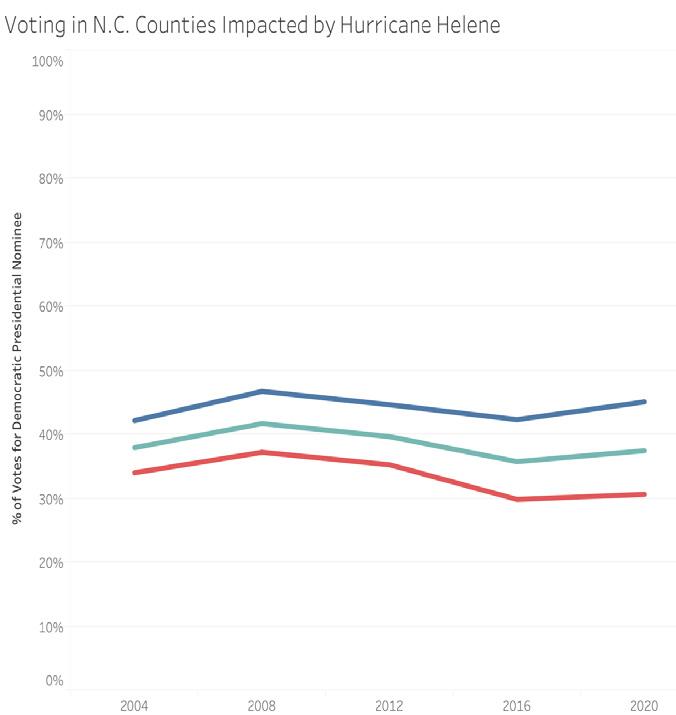
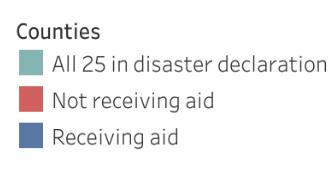
Support for the Democratic presidential candidate is higher in the counties receiving election assistance, with approximately 44% of voters backing the Democratic candidate in the past five election cycles. In comparison, only about 33% of voters in the 12 counties not receiving support did the same.
The largest contributors to this partisan gap are Buncombe and Watauga counties: two of the three counties — among the 25 in the disaster declaration — that have voted blue in at least one presidential election in the past five cycles. Combined, Buncombe and Watauga counties accounted for approximately 20% of ballots cast within the 25 counties, voting 61% and 54% Democrat, respectively, in the 2020 presidential election.
Buncombe contains the city of Asheville, which historically votes blue, and is one of the most densely populated counties impacted by the hurricane.
Watauga contains Boone, another city that has swung blue multiple times in the last few election cycles. A Democratic presidential candidate has carried Buncombe in every election since 2008 and carried Watauga in 2008, 2016 and 2020.
The emergency resolution approved by the NCSBE includes a number of changes to in-person and absentee voting processes.
Local boards of elections within the 13 affected counties are allowed to “modify” their early voting plans by a bipartisan majority vote that does not require approval from the state board. Such modifications can include changing the hours and days of operation for polling locations to improve accessibility and adding or removing polling sites.
The state board did not extend the deadline for North Carolinians to register, which was 5 p.m. Oct. 11. However, same-day registration is available at polling locations during the early voting period from Oct. 17 to Nov. 2.
“We have a wide opportunity for folks to still get registered even if they’ve been displaced,” said NCSBE Executive Director Karen Brinson Bell.
North Carolina has a 30-day residency requirement for voter registration, and the deadline to establish a new residence in advance of Election Day passed Oct. 6. Brinson Bell noted that voters who are only temporarily displaced due to the storm can register in their home county and vote by mail, and those who intend to remain permanently relocated can register in their new county of residence.
County boards can also modify their Election Day polling sites by bipartisan majority vote, though any modifications must be presented to the state board in a written resolution explaining that they are “required by the effects of the recent disaster.”
Such modifications could include the transfer of voters from one precinct to another within the same county, the establishment of multiple polling sites within the same precinct, the establishment of “out-of-precinct” polling locations that could possibly be located outside the county and the approval of central polling locations to be used by any voter within the county.
The resolution mandates that notice of any modification to Election Day polling locations will be given to the affected voters by mail, posted on the county’s website and delivered to all local media outlets and the chairs of county political parties. Board members shared during a Monday afternoon press conference that notices would also likely be posted in disaster relief shelters.
To address staffing shortages in light of the disaster, the emergency resolution allows
county boards to appoint election officials who are registered in other counties to oversee voting in the 13 included in the resolution. Local boards are also empowered to appoint emergency assistants for Election Day and reassign poll workers “to ensure there is sufficient knowledge and experience at each voting site.”
Brinson Bell shared that the state is coordinating with federal relief agencies to establish temporary polling sites, such as National Guard tents or trailers provided by the Federal Emergency Management Agency, in areas where the previously designated locations suffered significant damage.
The NCSBE also made a number of changes to how voters in the affected counties can receive and return absentee ballots.
The state began distributing absentee ballots Sept. 20 — eight days before Helene hit North Carolina — and many still in transit were lost amid the hurricane. Brinson Bell advocated for voters “concerned about the status of their ballot” to check BallotTrax, a state-provided service that tracks ballots through the mail stream.
Voters in the affected counties can now request or receive their ballots in person at their county board of election office up until Nov. 5. In the event that they are unable to access their local board’s office, they can deliver their completed ballot to another county’s board or the state board.
All absentee ballots still must be received by a county board of election by 7:30 p.m. on Election Day, Nov. 5.
See HELENE on Page 11
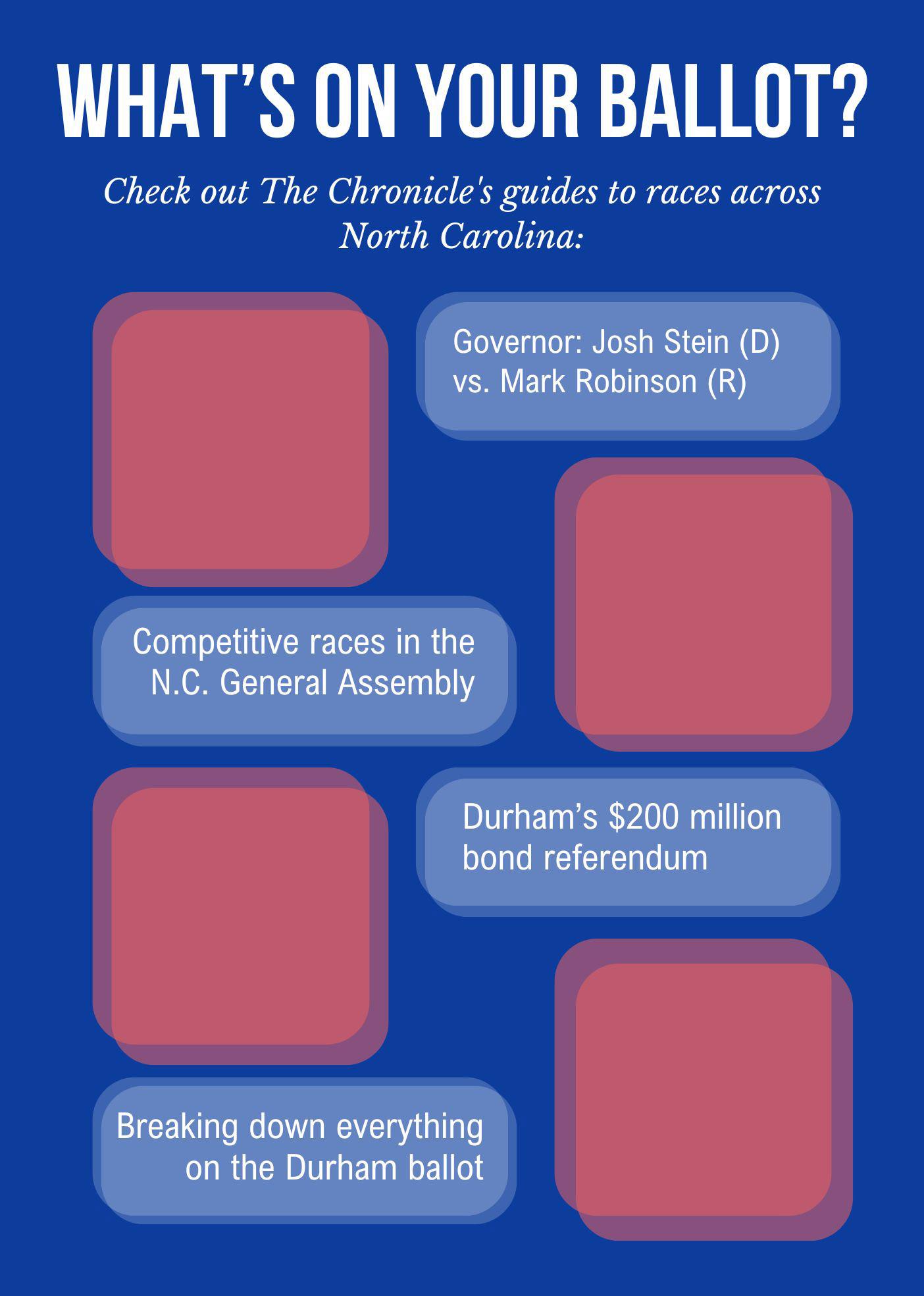




By Mekhi Patterson
Oct. 28, 2024
Contributing Writer
Blue Devils could be on your ballot next week. These Duke community members — some alumni of the University’s undergraduate and professional schools, others former employees and one a current student — are running for office at various levels and branches of the government this election season.
Angela Alsobrooks, Trinity ‘93, is running for a seat representing Maryland in the U.S. Senate. She currently serves as executive of Prince George’s County in Maryland.
Alsobrooks received her bachelor’s degree from Duke, double-majoring in public policy studies and Afro-American studies. She was also a member of Delta Sigma Theta Sorority, Inc.
She later received her Juris Doctor from the University of Maryland School of Law in 1996.
Alsobrooks, a Democrat, remains ahead of her opponent, former Maryland Gov. Larry Hogan, a Republican, in recent polls.
Alsobrooks has spent her entire political career in Prince George’s County, where she began as an assistant state’s attorney in 1997, later becoming the county’s first fulltime prosecutor assigned to domestic violence cases. She was elected state’s attorney in 2010 and was elected to her current position in 2018.
Alsobrooks spoke at the 2024 Democratic National Convention, where she served as a delegate for Maryland. She has been endorsed by Vice President Kamala Harris and former President Barack Obama, among others.
Rep. Mike Levin, Law School ‘05, is running for his fourth term representing California’s 49th Congressional District in the U.S. House of Representatives.
Levin, a Democrat, is a member of the Congressional Hispanic Caucus and Congressional Progressive Caucus. He is also the ranking member of the Subcommittee on Economic Opportunity in the Committee on Veterans' Affairs, a member of the Subcommittee on Health in the Committee on Veterans’ Affairs, and a member of the Subcommittees on Federal Lands and on Water, Wildlife and Fisheries in the Committee on Natural Resources.
Rep. Scott Peters, Trinity ‘80 and a Democrat, is running for his seventh term in the House. He represented California’s 52nd Congressional District until 2023, when his constituency was redistricted into the 50th Congressional District.
Peters received his undergraduate degree from Duke, where he studied economics and political science.
After graduating, he worked as an economist for the Environmental Protection Agency before receiving his Juris Doctor from the New York University School of Law in 1984. He practiced as a lawyer for several years, then served as legal counsel to San Diego County from 1991 to 1996 and as
a San Diego City Council member from 2001 to 2008.
Former instructor Guy Meilleur will be on the ballot as the Libertarian candidate for North Carolina’s 4th Congressional District, which includes Durham County.
While at Duke from 2000 to 2007, he taught numerous courses on “tree physiology, ecology and tree appraisal.”
N.C. General Assembly
Ray Ubinger, Trinity ‘87, is the Libertarian candidate running to represent the 22nd District in the N.C. State Senate.
Ubinger also ran unsuccessfully for the seat in 2018, 2020 and 2022. In 2022, he informed The Chronicle that he was “not asking anyone to vote for [him]” and does not “campaign, accept donations or do questionnaires/forums/interviews/pledges.”
“I am, as my committee name puts it, Just Buying Permission to Vote for Myself,” he wrote in a 2022 email to The Chronicle.
At Duke, he majored in mathematics and was a member of student government and Army ROTC.
Incumbent Dan Blue Jr., Law School ‘73, is running for reelection to the N.C. State Senate’s 14th District, a role he has been in since 2009.
FROM PAGE 9
Only one county that had historically voted Republican changed its affiliation in the Trump-era: New Hanover, the third most densely populated county in the state.
Home to Wilmington, New Hanover County went blue for the first time since at least 2004. Prior to that election, it was the only major city in the state considered a Republican stronghold. This cycle, it has emerged as a political hotspot, with Second Gentlemen Doug Emhoff, Republican vice presidential nominee JD Vance and Trump hosting rallies in the city with the hopes of securing its citizens’ votes.
New Hanover has seen steadily increasing voter turnout — which reached nearly 70% — and accounted for 2.4% of all North Carolinian votes in the 2020 election.
Other trends
Three N.C. counties have always voted for the candidate that ended up carrying the state.
Caswell, Hyde and Jackson counties have voted the same as the overall state in every election since at least 2004.
No county has been perfectly aligned with the national outcome in all five most recent election cycles, although 10 out of North Carolina’s 100 counties have come close, voting for the overall winner four out of five times.
Party affiliation does not always define North Carolinians’ voting habits.
While Republicans have won North Carolina's electoral votes in most presidential elections since 1976, Democrats hold the winning record in N.C. gubernatorial races, with a Democratic governor elected in nine of the last 12 elections.
He is the current minority leader in the senate as a member of the Democratic Party. In the past, he served as the chair of the Duke University Board of Trustees, the first Black person to hold the position.
Blue previously served in the N.C. House of Representatives from 1996 to 2002 and returned in 2006, serving until he was selected to replace Sen. Vernon Malone after his death in 2009.
Mike Schietzelt, Law School ‘18, is a Republican running to represent North Carolina’s 35th District in the state House, which includes parts of Wake County. He currently works as an attorney in business litigation.
Former Duke Law faculty member Ya Liu is an incumbent in the state House running for reelection in North Carolina’s 21st District. She is the first Chinese American to serve in the N.C. General Assembly and one of the first Asian American women to serve in the state House, elected in 2022 alongside Rep. Maria Cervania.
A Democrat, Liu represents parts of Wake County — including Cary — in her current position, which was held by Blue from 1985 to 2003. She previously served as a Cary Town Council member representing Ward D.
Voting data provides little explanation for this split outcome. Gubernatorial races in North Carolina occur in the same year as presidential races, and the races receive a nearly identical number of votes. In other words, people are voting for both races on the same day but are splitting their ballot between parties.
These trends could indicate that voters are showing up informed on Election Day, opting to choose candidates on an individual basis rather than based on a party label.
FROM PAGE 2
“I think the biggest tests are going to have to be around those cultural issues,” Miller said.
Although Hildebrand has noticed a newfound “sense of possibility” and “optimism” in the Democratic Party, he wants people to remember that “as of right now, Kamala Harris is still the underdog.”
“Everyone needs to understand the stakes of this moment,” Hildebrand said. “… I hope that Americans’ response to this is [that] those who are at risk of disengaging will reengage, will participate, vote, turnout, organize — do all of the things that we need them to do in campaigns and certainly not grow complacent.”
Editor’s note: Portions of this story were updated for print.
FROM PAGE 10
Brinson Bell reported that the postal service is now operating in all 100 counties
N.C. Executive Branch
Mo Green, Trinity ‘88 and Law School ‘91, is the Democratic candidate for North Carolina’s superintendent of public instruction.
Previously, Green was the superintendent of Guilford County Schools — the thirdlargest district in North Carolina — and also served as general counsel for CharlotteMecklenburg Schools.
In his undergraduate years at Duke, Green majored in economics and political science. He was also a member of Alpha Phi Alpha Fraternity, Inc., the Black Student Alliance and Law Moot Court.
Sen. Natasha Marcus, Law School ‘94 and a Democrat, currently represents District 41 in the state Senate and is running for N.C. commissioner of insurance. In this four-year position, she would be the head of the N.C. Department of Insurance, as well as the State Fire Marshall.
N.C. Judicial Branch
Current Duke Law student Jefferson Griffin is running for an N.C. Supreme Court seat. Griffin, a Republican, is currently a judge on the N.C. Court of Appeals. He is expected to receive his Master of Laws from the Law School in June of 2026.
FROM PAGE 9
sources and using social media judiciously to avoid unwittingly sharing disinformation.
Antepli agreed that the Duke community has a key role to play in dealing with the “pressing challenges that American society is struggling with,” noting that respectful dialogue may offer a solution.
“We on our campus have to take that as a moral responsibility and model and exemplify what that civil discourse would look like,” Antepli said.
Currently, the University facilitates multiple initiatives dedicated to platforming bipartisan conversations, such as Braver Angels debates, the Civil Discourse Project, Polis and the Provost’s Initiative on the Middle East.
To Antepli, the event serves as a call to “reevaluate our understanding of pluralism and diversity,” which are values he believes the University must continue to center in its allocation of resources and its hiring practices.
Antepli views a “broader political spectrum” as a key component of diversity and inclusion efforts and called on the community to do “all we can” to engage with people not represented on Duke’s campus.
Dalhouse echoed these sentiments and also encouraged students to exercise their right to vote “whichever way they choose.”
Michael Austin contributed reporting.
Editor’s note: Portions of this story were updated and condensed for print.
within the state, though she acknowledged that some communities within individual counties are still facing accessibility issues around the delivery and receipt of mail.
Editor’s note: Portions of this story were updated and condensed for print.










KAMALA HARRIS CAST THE TIE-BREAKING VOTE TO PASS THE LARGEST INVESTMENT IN CLIMATE ACTION IN HISTORY.
- 37% IN GREENHOUSE GAS EMISSIONS + 1.5M NEW JOBS + $3,562 INCREASE IN REAL DISPOSABLE INCOME PER CAPITA
THE OTHER GUY SAID CLIMATE CHANGE IS A HOAX INVENTED BY CHINA.
ELECTION DAY: NOVEMBER 5
